Salvador has its own cuisine. You’ll see baianas de acarajé (ah-kara-JEH) everywhere, often dressed in white (the color of Iansã, female deity of wind and storms), tables spread with a spicy and exotic assortment of Bahia’s own version of fast-food.
An acarajé is basically a deep-fried “bread” made from mashed beans from which the skins have been removed (reputedly feijão fradinho — black-eyed peas — but in reality almost always the less expensive brown beans so ubiquitous in Bahia).
In West Africa these are called akara; “acarajé” in Yoruba is “to eat akara”. The mash is deep fried in dendé oil (derived from a nut found on the dendé palm) and the resulting acarajés are usually eaten accompanied by camarão (small sundried shrimp), pimenta (hot pepper sauce), vatapá (a paste made from sundried shrimp, peanuts, cashews, coconut milk, and dendé), caruru (kind of an okra stew), and salada (salad: diced tomatoes, onions, and coelantro).
These “fillers” can be included or left off at will, and the camarão will cost a little extra. A variation on the acarajé is the abará. An abará is fundamentally the same as an acarajé except that rather than being deep-fried it is boiled in a banana leaf.
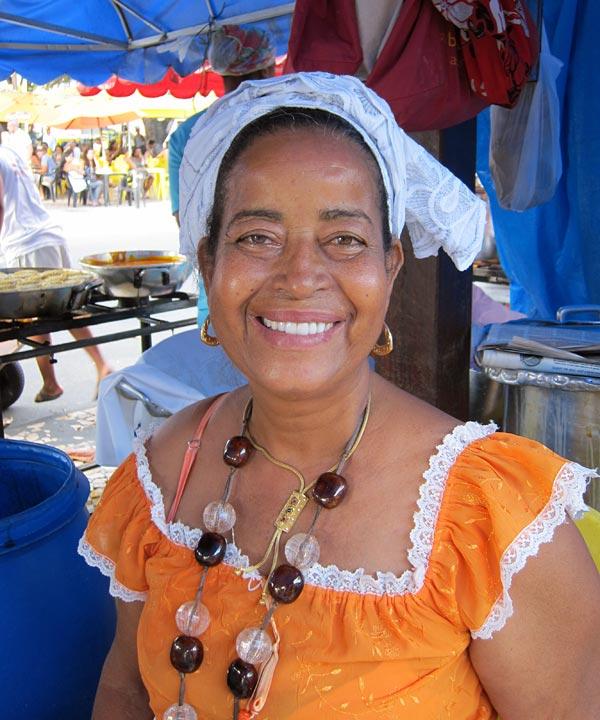
The other ubiquitous food here is moqueca (moo-KEH-ka), a stew usually both cooked and served in a large clay bowl and consisting principally of some kind of seafood (or combination thereof), dendé and coconut milk (along with a panoply of other ingredients in accordance with regional styles and the cook’s personal preferences.
Bobó (bo-BO) is moqueca thickened with aipim (manioc). Sometimes the dendé is left out of these dishes in order to spare delicate stomachs, but to me that’s like eating garlic bread without the garlic.
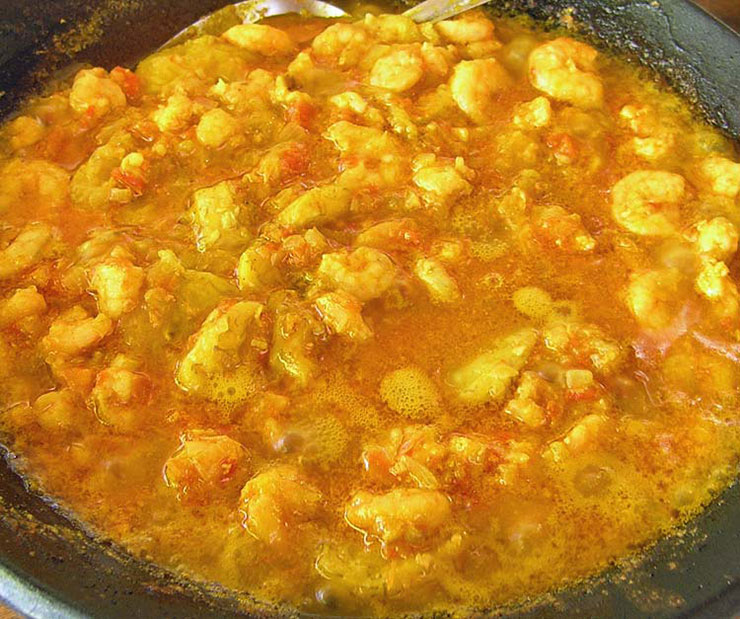
Manoel dos Santos Pereira was a guy who liked to cook for friends and family. He had a simple summer house on the island of Itaparica, with a big veranda which on weekends he liked to set up with tables for extensive gatherings of kith and kin. The house was close to the beach in the village of Conçeicão, which in turn is next to Itaparica’s Club Med.
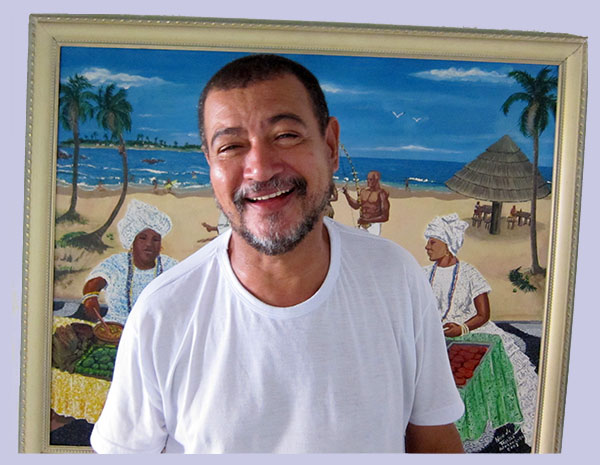
So one fine day a Frenchman decided to leave the self-contained confines of the Club Med for a look around at the local life. His wanderings brought him to what appeared to be a lively restaurant packed with customers and with a wonderful aroma of seafood emanating from the kitchen.
The monsieur stepped up, found himself a table, sat down, and ordered the dish of the day (moqueca de aratú — red crab). The man was welcomed and happily served. When the check was asked for Manoel explained as best he could that this was in fact was a private domicile, that the meal was a gift, and that the man should consider himself among friends. To this day Manoel is not sure whether he succeeded in making his point clear.
Whatever the gentleman’s understanding, the following the weekend he was back, this time accompanied by friends, and this time determined to pay. Thus was born Axego (derived from aconchegado, something like cozy). Some years later Axego moved across the bay to the mainland, first onto Rua dos Adobes in the neighborhood of Santo Antônio, and then into a space with a wonderful view overlooking the water, across from the Convento do Carmo.
Manoel himself went out daily and purchased the ingredients for his dishes. He himself prepared the foods. And it was he who waited on his customers (aided by his wife Lia (Maria do Carmo Santos Pereira), and his son Fabrício). The restaurant’s reputation grew by dint of word-of-mouth, and it prospered. Prospered to such a degree (within its modest bounds) that when the lease was up the landlady figured she’d throw Manoel out and open up her own restaurant in the space.
The result for this woman was, as one might imagine, a well-deserved disaster. After a couple of not entirely satisfactory locations Manoel is now on Rua J. Castro Rabelo, near the intersection of that street with Rua João de Deus.

O Cravinho is Julival’s excellent place, devoted to infusões (cachaça mixed with spices, fruits, roots, barks, and other flavoring agents; cravinho is made with cravo, or cloves — it was invented here), but serving beer and other drinks and with great, inexpensive food in the restaurant (located in the rear behind the bar and opening mid-afternoon). Very popular with the locals, atmospheric, with the infusões in wooden barrels set on shelves up high in the bar, and the restaurant’s tables and stools cut from tree trunks.
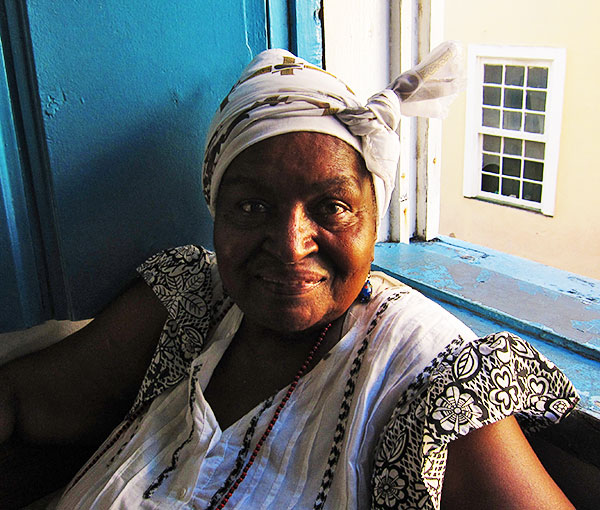
Alaíde was born Alaíde da Conceição but became Alaíde do Feijão (Alaíde of the Bean). As a young girl back in the ’40s she began helping her mother at her mother’s table of quitutes (Bahian sweets and snacks) in Praça Cayru across from the bottom of the Elevador Lacerda…taking over the table herself in the 1970s.
In 1992 she opened a restaurant — something like what would be called a “soul food” restaurant in the United States — moving several years ago from her original location to where she is located now on Rua das Laranjeiras (two corners down from the Terreiro de Jesus). Her specialty is feijoada, Brazil’s national dish, invented by enslaved who would add whatever meat “trimmings” were not wanted in the plantation owner’s “Big House” to beans and their own sense of seasoning.
The restaurant is a simple place and an unpretentious hangout for people like Ilê Aiyê founder Vovô dos Santos, Olodum director João Jorge, and É o Tchan pagodeiro Compadre Washington. Two presidents of Brazil have come to pay homage to Alaíde, as well as has American actor Danny Glover. Alaíde is a beloved and truly deserving member of Bahian society.
Cuco Bistrô, on the Praça do Cruzeiro (the square off of the Terreiro de Jesus, bounded on its far end by the massive Igreja de São Francisco), is owned and run by Iglêsias, a Spaniard brought to Salvador as a child and who spent seven years in the intervening period living in Zurich. The “cuco” in the name is the denomination of the little wooden bird which pops out of the famous Swiss clocks hourly, counting out the time. It’s a lovely, well-run place with an imaginative menu beginning in Brazil’s Nordeste (Northeast) but reflecting Iglêsias’ cosmopolitan history.
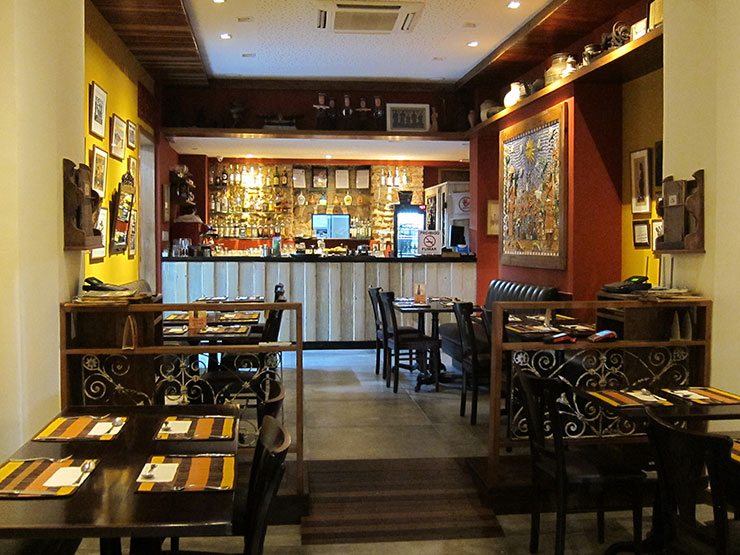
They have a website: http://www.cucobistro.com.br
Mama Bahia is down a block from the Terreiro de Jesus on Rua Portas do Carmo…on the corner there. There’s usually a row of tables set up outside and seating inside as well. Mama Bahia is owned by Roberto Simon and the restaurant is run to exacting standards, with excellent food running the gamut from moquecas and other seafood to perfect steaks. Plus, there’s often/usually a guitar player/singer in the corner there, usually Zéu Lobo (from the interior of Bahia) or Françoise, a lovely French woman with a lovely voice…both singing (very well) sambas and bossas nova, with Françoise throwing in the occasional French ballad.
To love is beautiful…few would argue with this. And this is the rather slyly disguised name of a hotel here in Pelourinho on Rua Portas do Carmo, expressed thusly: Casa do Amarelindo (House of Toloveisbeautiful). The hotel is beautiful too, owned by two gay Frenchmen, and upon the upper, bay-facing level is a de-lovely restaurant — Pelô Bistrô — looking out to the water.
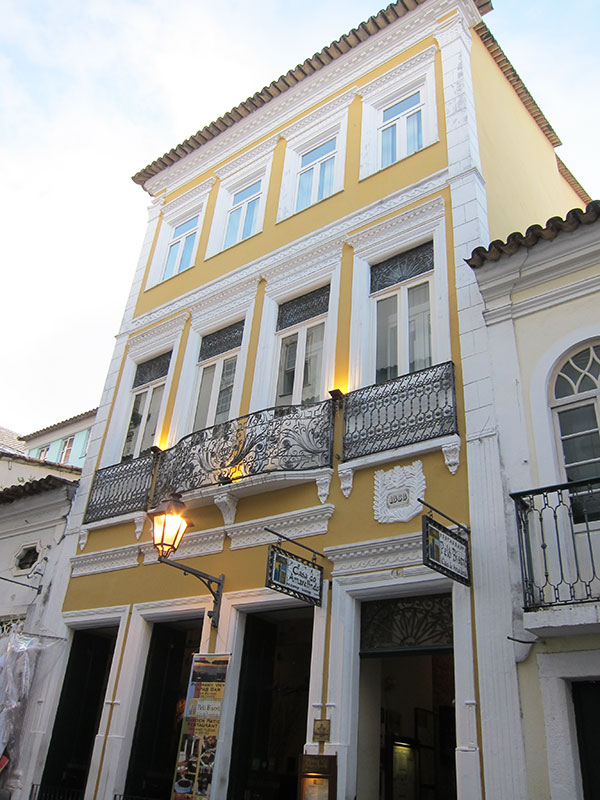
French-style, a menu is posted on the front of the hotel.
Rather than adventures on the wine-dark sea, Ulisses of Santo Antônio além do Carmo serves Bahian regional food in his tables-in-the-street boteco just up from the Cruz do Pascoal.
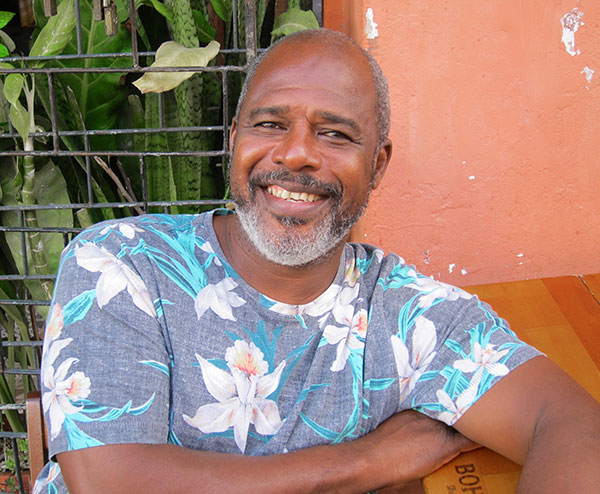
The name of his establishment is Abará da Vovó…Grandma’s Abarás, and the food is great and cheap! Hours are Tuesday through Saturday, 11:30 a.m. to 10 p.m., Monday 11:30 a.m. to 3 p.m., closed Sundays. Rua Direita do Santo Antônio, 18.
More to come here! I’m in the process of moving and re-doing from the old site!
